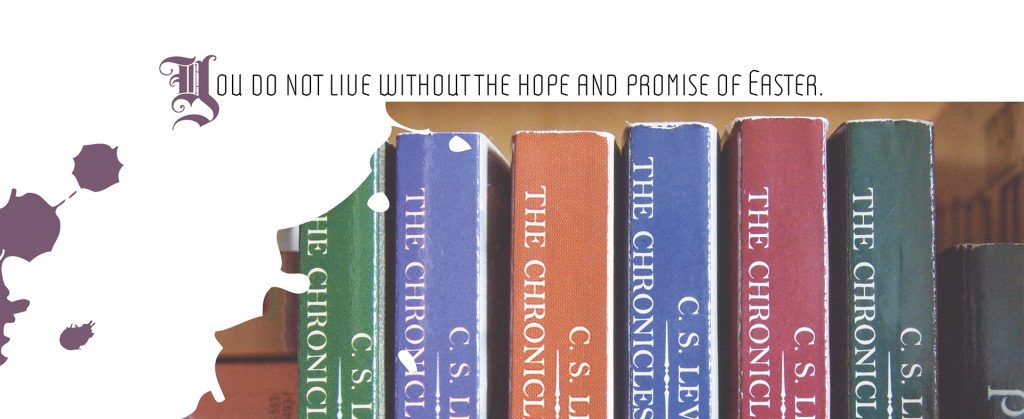Always Lent But Never Easter
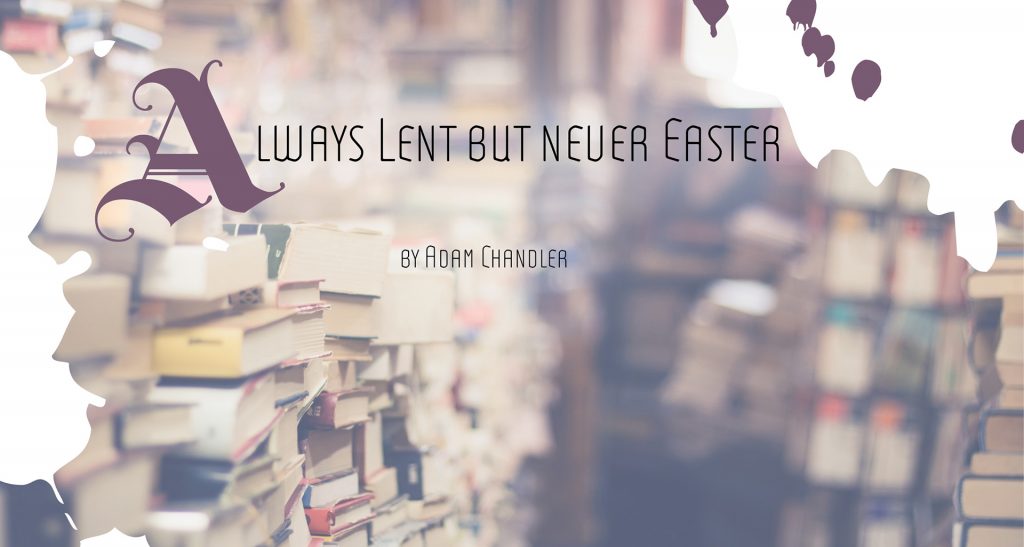
by Adam Chandler
In the much beloved tale spun by C.S. Lewis, The Lion, the Witch, and the Wardrobe, the world of Narnia was in a state where it was always winter but never Christmas. Without Aslan the Lion present, the desolation of cold and snow lay upon the land. Christmas is prevented from coming for a whole century due to the influence of the White Witch, the pretender to Narnia’s throne. It is only once Aslan returns to Narnia that the snows melt away and the creatures imprisoned by the Witch are freed to celebrate. When the great Lion comes, the evil of the world peels back and the joy of Christmas comes again.
The story of Narnia is, of course, mimicking biblical narrative. The world was once held captive by sin, death, and the devil, but Christ was born on Christmas Day to die on the cross and free us from our captivity to sin. The joy we experience in the Christmas story parallels the joy of the Narnians when Aslan returns to overthrow the White Witch.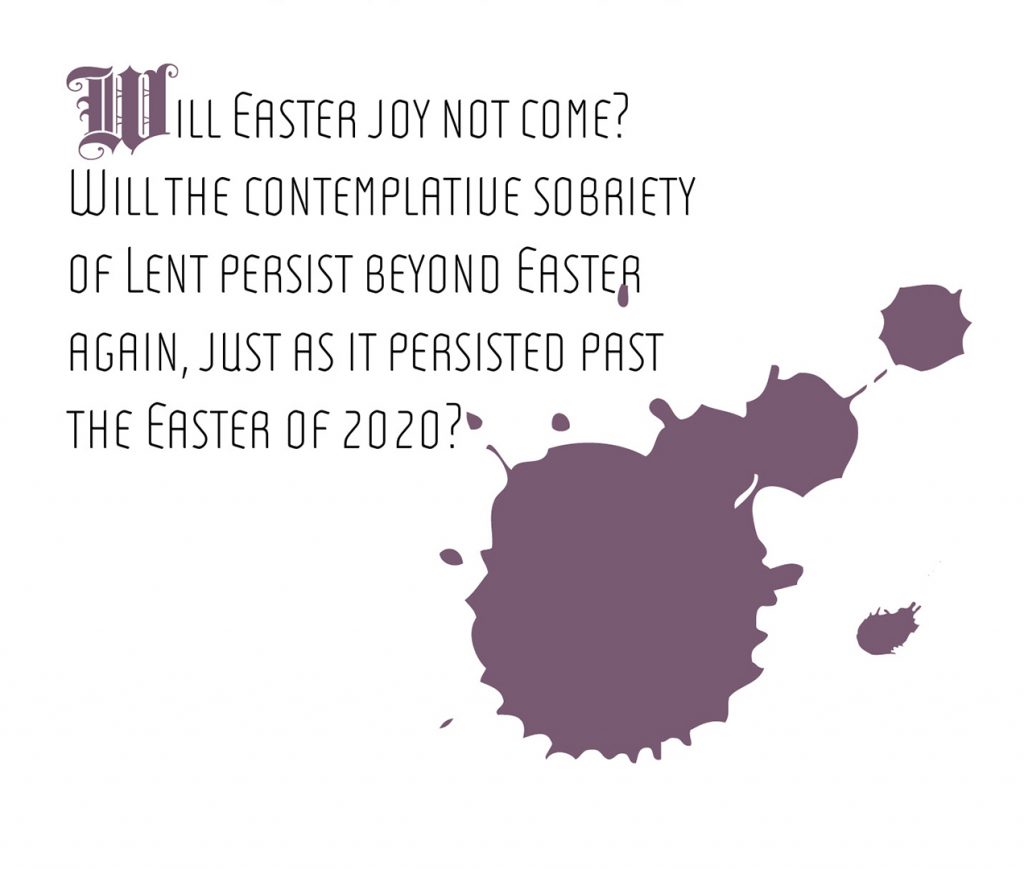
For us, the joy of this past Christmas—much like the usual joy we have on Easter—has been dampened by a cold and sober atmosphere. December 25 may have come around, but our typical family celebrations were restricted in order to reduce transmission of the COVID-19 virus. Christmas Day came but festivity was in limited supply. And now what? This somber tone of celebration has extended towards Easter as well. Will Easter joy not come? Will the contemplative sobriety of Lent persist beyond Easter again, just as it persisted past the Easter of 2020?
When shutdowns first began in Canada, we were in the midst of Lent 2020. And while time has marched on, the general atmosphere of sober thought, heightened prayer, and deep reflection over personal actions has remained. Even people outside of the Church were caught up in sober attitudes as the sweeping fear of COVID-19 hung in the air. The Canadian Lutheran came out with an article about this “Long Lent” that marked our peculiar new mentality. Even when shutdowns gradually gave way into reopening in some parts of the country, we still found ourselves in intense modes of thinking.
A year later and through a second season of Lent under COVID, the background intensity of devotional solitude and somber contemplation remains. Will it always be Lent and never Easter?
If we are looking for an Easter marked by a bunny distributing chocolate to sweet-toothed girls and boys, then we could say that it happened. The normal commercial fanfare arrived in due season. Or if Easter is instead considered a time for family and friends to join together, then perhaps Easter is still another year or two off. Such togetherness is still restricted under social distancing regulations. But if we remember what Easter truly is, then we will agree that Easter is not hindered or cancelled; it has come in power.
On Easter, Christ burst forth from the tomb in glorious resurrection. Once dead and buried, Christ rose to life. In His flesh was the freshness of life, and in His blood coursed the new creation wherein death has no hold. No evil or threat of death could keep Him bound to the grave because He is life incarnate (John 1:4, 14; 11:25).
Who is Christ but life itself? Easter marks how the corruption of nature—sin and its consequence of death—failed to overpower and consume the Creator of all things. Jesus is the source of all life, the One who created the life of the universe out of nothing. Therefore, the nothingness of death (an uncreation, if you will) has no ability to halt or hem Him in. It was so in the beginning. It will remain so in the end.
Yet, what of our sorry state? Such Easter joy does not quite burst forth in the Lenten season, for Lent is instead given to sober reflection and denial of self. But if we spend Lent merely reflecting on ourselves and on our actions, then we have only observed half of Lent. Our penitential joy for Lent must be considered ultimately in light of what God does for us.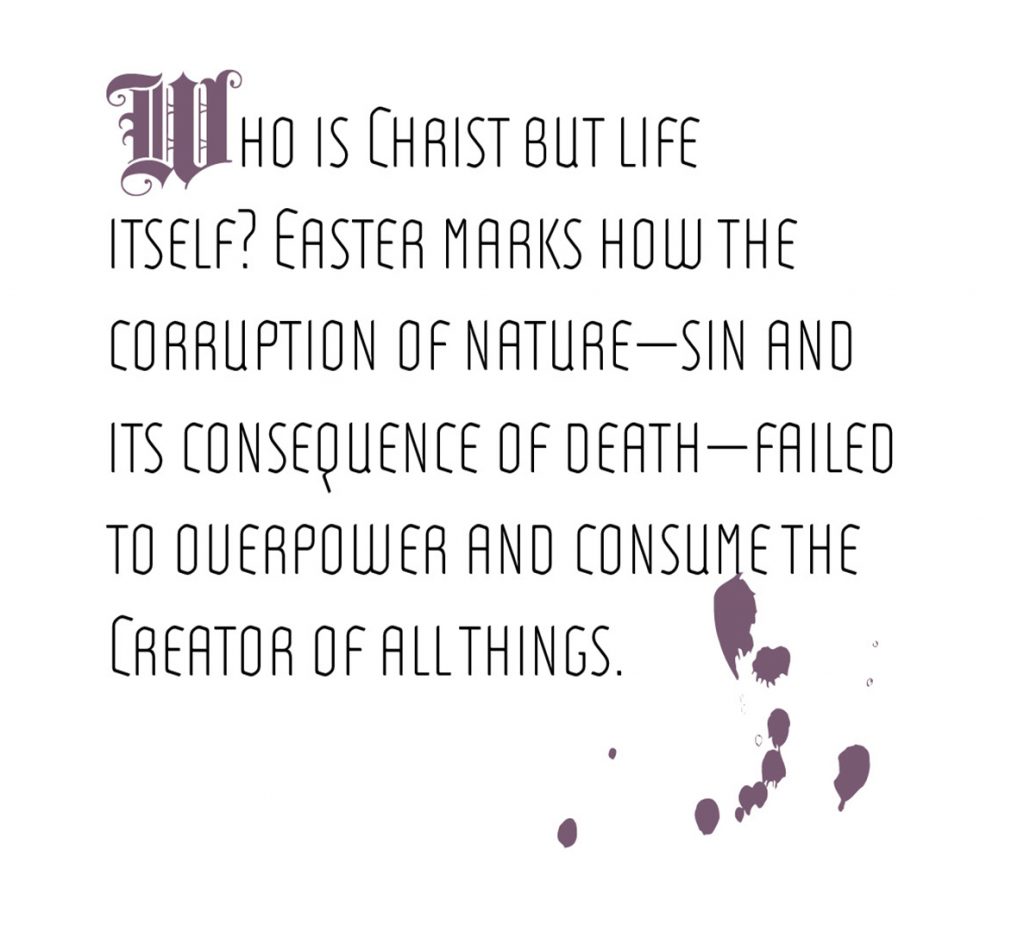
No confession of sins is complete without the absolution of our God. God is faithful and just, and will forgive us our sins and cleanse us from unrighteousness upon our confession (1 John 1:9). Confession of sins, made in faith, will always be responded to with the absolution of the Lord. This is why, immediately after the confession of the congregation in a church service, the pastor turns and proclaims to the people that in Christ the sins they have confessed are truly forgiven. Sin weighs people down to death, but Christ raises them up into a life of righteousness, placing His life within the penitent.
No, Lent is not simply about reflecting on ourselves; it is about reflecting on what God does for us. Even when we give things up for Lent, there is an implicit acknowledgement that God is the One who has given us all good things; we merely set these blessings aside temporarily in order to admire God as the supreme good who blesses us.
Lent is woefully incomplete without the promise and hope of God working within us. And no season of Lent is ever done outside of the knowledge and support of the resurrection of our Lord on Easter morning. Every “alleluia” gone unsaid, every food fasted from, and every extra devotional read is enlightened by the Light of Light and Lord of Lords who rose from the grave on Easter. There is no Lent without an Easter. For our Lord has already risen from the dead, risen on that Easter morning two millennia ago to live eternally. All the faithful who perished before the resurrection, all who have fallen asleep in the flesh after Christ walked out of the tomb, will be raised from the dust of death on the Last Day when Christ reunites their spirits and their flesh. The Easter resurrection of Christ and the coming resurrection of the dead are fixed in the history of the universe and remain unmoved. No virus or misfortune can change this. We might feel like we are in a perpetual Lent but we will never be without Easter.
In truth, our penitential joy in this “Long Lent” is more sober than joyful. You probably never wanted to give up hanging out, handshakes, and hugging for Lent. But we continue forward through this time with the life of Christ within us and the promise of the resurrection clinging to our flesh. There is a joy that remains despite the darkness of thoughts that may cloud your mind.
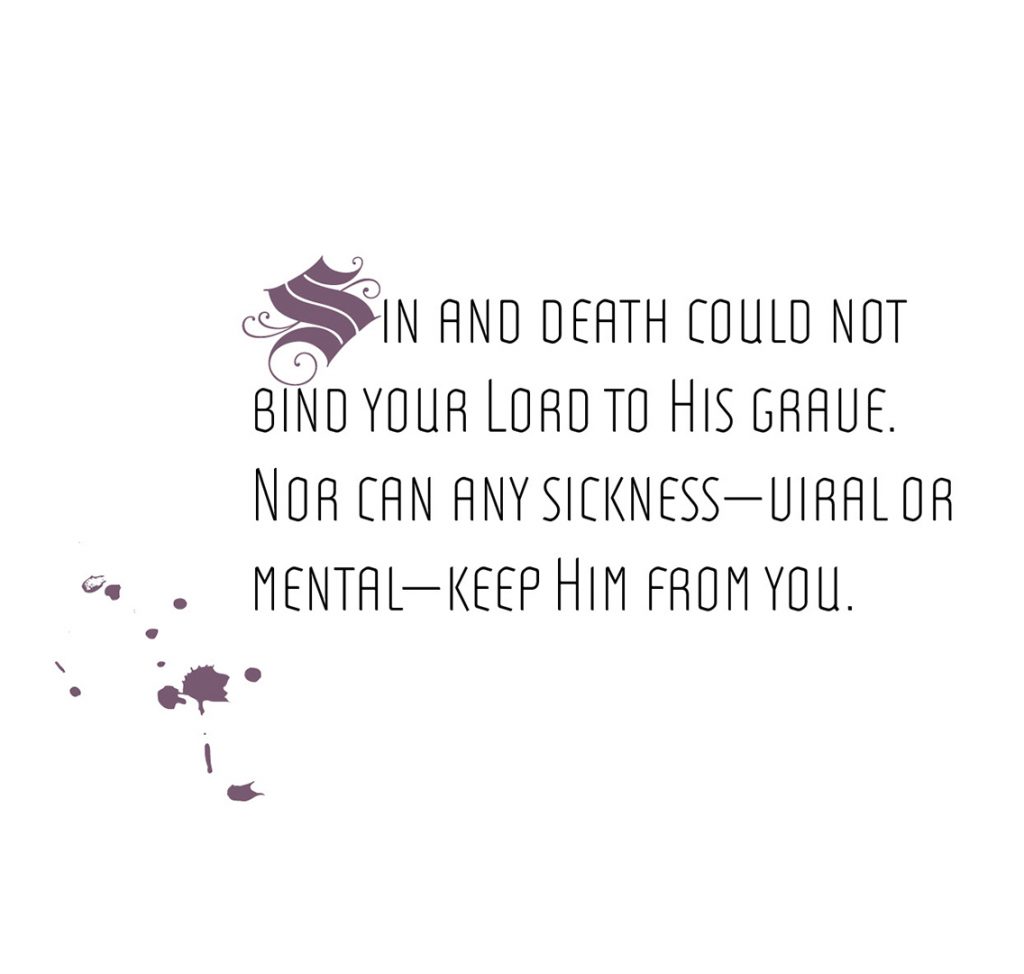 Anxiety and depression are real and present things. They should not be sloughed off as superficial or impious. Not all of us may have fallen into the depths of mental fatigue or illness, but we should be mindful that the fear and loneliness of this period still affects us to some degree. This is not quite the same world it was two years ago. It is possible to know intellectually that we have passed through the literal season of Lent to the joy of Easter, but for the emotional uplift of that knowledge to still lie dormant.
Anxiety and depression are real and present things. They should not be sloughed off as superficial or impious. Not all of us may have fallen into the depths of mental fatigue or illness, but we should be mindful that the fear and loneliness of this period still affects us to some degree. This is not quite the same world it was two years ago. It is possible to know intellectually that we have passed through the literal season of Lent to the joy of Easter, but for the emotional uplift of that knowledge to still lie dormant.
Job provides a grand example of what it feels like to be stuck in a Long Lent. Like us, Job was stuck in gloomy contemplation of the sorrows that had befallen him. It’s possible to misinterpret Job’s suffering as if it was a rather short affair. It was not. Job suggests several months of pain had passed before he let loose his first outcry of the book (cf. Job 7:3). His initial responses to his affliction are faith-filled and admirable (Job 1:21; 2:10), but the strain on Job deepened as time crawled along. Grief churned and ground itself within him for months so that, when he finally spoke, Job poured out a preference for uncreation and death rather than to remain in a life defined by suffering (Job 3). Yet, Job’s hope was not truly in death but in his Lord alone. For as Job remarks upon further reflection:
“Oh that you would hide me in Sheol, that you would conceal me until your wrath be past, that you would appoint me a set time, and remember me! If a man dies, shall he live again? All the days of my service I would wait, till my renewal should come. You would call, and I would answer you; you would long for the work of your hands.” – Job 14:13-15
Job’s ultimate hope throughout his suffering in a prolonged Lent was not death, nor was it even a restoration of the people and possessions he once had. Job’s hope is the Lord God Almighty Himself, who can call him up out of death and suffering, resurrect him from Sheol. Job desires new life. His hope and prayer is for the resurrection we have in Jesus Christ our Lord. In his misery, Job’s sober joy is in Easter.
The suffering of this world may afflict you. It may break you down, especially as time goes on. But you do not live without the hope and promise of Easter. No Lent has ever occurred without the promise of Easter. Every Lententide you have experienced is undergirded by the joy of Jesus’ resurrection. This Long Lent is no exception. You remain in the life of Christ and in the power of the resurrection which He won for you. Sin and death could not bind your Lord to His grave. Nor can any sickness—viral or mental—keep Him from you. We might be living in a world that is always Lent; but even now, it will also always be Easter.
———————
Rev. Adam Chandler is pastor of Hope Evangelical Lutheran Church in Victoria, B.C.
